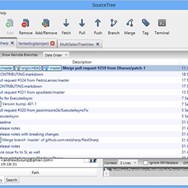
SourceTree
SourceTree is a free desktop Git and Mercurial client for Windows and macOS. It provides a graphical user interface for managing your repositories, simplifying complex version control operations and allowing both novice and experienced developers to visualize and interact with their code history effectively.
About SourceTree
SourceTree is a powerful yet intuitive graphical client for Git and Mercurial, the industry's leading distributed version control systems. Designed to make working with repositories easier and more visual, SourceTree eliminates the need to memorize command-line syntax for common operations while still providing access to advanced features. Whether you're a beginner just starting with version control or a seasoned pro managing complex workflows, SourceTree aims to streamline your development process.
Key capabilities include:
- Visualizing Repository History: Easily view commits, branches, and tags in a clear, interactive graph. Understand the evolution of your project and identify specific changes quickly.
- Simplified Branch and Merge Management: Create, switch, and manage branches with simple clicks. Perform merges and rebase operations visually, making conflict resolution more manageable. SourceTree's integrated merge tool assists in resolving differences line by line.
- Integrated with Hosting Services: Seamlessly connect with popular Git and Mercurial hosting platforms like Bitbucket, GitHub, GitLab, and Azure DevOps. Clone repositories, push/pull changes, and manage pull requests directly from the application.
- Powerful Git-flow Support: Native support for the Git-flow branching model helps enforce consistent and effective branching strategies for your projects. Initialize and manage Git-flow branches with dedicated tools.
- Interactive Rebase: Modify commit history, rearrange commits, and clean up your branch before pushing changes, all through a user-friendly graphical interface.
- Submodule Support: Manage Git submodules within your projects, simplifying the inclusion and management of external dependencies.
- Custom Actions and Extensions: Extend SourceTree's functionality with custom actions and plugins, allowing integration with other development tools and workflows.
- Built-in Tools for Common Tasks: Access integrated diffing and merging tools, stash changes for later use, and perform common operations like cloning, committing, pushing, and pulling effortlessly.
SourceTree is designed to be flexible, catering to individual developers and teams of any size. Its graphical interface provides a clearer understanding of your repository's state, reducing errors and improving productivity. By bridging the gap between command-line power and graphical ease of use, SourceTree empowers developers to harness the full potential of Git and Mercurial.
Pros & Cons
Pros
- Free to use for individuals and teams.
- Provides a clear visual interface for Git and Mercurial.
- Simplifies complex version control operations.
- Seamless integration with popular hosting services.
- Good support for Git-flow and interactive rebase.
Cons
- Can sometimes be less flexible than the command line for niche tasks.
- Interface can become cluttered with very large repositories.
What Makes SourceTree Stand Out
Free for unlimited users
Provides full functionality without cost, making it accessible for individuals and teams of any size.
Cross-Platform Compatibility
Available on both Windows and macOS, offering a consistent experience across different operating systems.
Visual Repository History
Presents a clear graphical representation of repository history, simplifying understanding of changes and branches.
Features & Capabilities
14 featuresExpert Review
SourceTree stands out as a robust and accessible graphical client for Git and Mercurial. Its primary strength lies in demystifying the complexities of distributed version control through a well-designed user interface. For individuals and teams who prefer visual tools over the command line, or those new to version control entirely, SourceTree provides a welcoming entry point.
The application effectively visualizes the repository history, presenting branches, commits, and merges in an interactive graph. This visual representation is invaluable for understanding the state of your project and how different lines of development have converged or diverged. Navigating through commits, inspecting changes, and identifying when specific modifications were introduced becomes significantly easier compared to relying solely on command-line output.
Key features like Git-flow integration are particularly beneficial for teams adopting structured branching strategies. SourceTree provides dedicated tools to initialize and manage Git-flow branches, helping to enforce consistency across the development lifecycle. The interactive rebase feature, while a powerful Git concept, is made more approachable through SourceTree's interface, allowing users to modify their commit history with greater confidence.
Integration with major repository hosting services such as Bitbucket, GitHub, GitLab, and Azure DevOps is seamless. Cloning repositories, pushing and pulling changes, and even managing elements like pull requests (depending on the integration level) can be done directly from SourceTree, streamlining workflows and reducing the need to switch between applications.
The built-in merge and conflict resolution tools are functional and provide a visual way to address discrepancies between file versions. While not as sophisticated as dedicated diffing tools, they are sufficient for many common conflict scenarios and are a significant improvement over manual command-line resolution for many users.
SourceTree's performance is generally good, and it handles large repositories effectively. The option for a dark theme is a welcome addition for those who prefer it. The application also includes shell integration, allowing users to quickly open a terminal in the repository's directory if command-line operations are required for specific tasks.
However, it's worth noting that like any graphical client, SourceTree might occasionally have limitations compared to the full power and flexibility of the command line, especially for highly specialized or complex operations. While sufficient for the vast majority of common tasks, advanced users might still find themselves switching to the terminal for certain actions. The user interface, while generally intuitive, can become cluttered in repositories with a very large number of branches or tags.
In summary, SourceTree is an excellent tool for anyone working with Git or Mercurial who values a graphical interface. It simplifies complex operations, provides clear visualization of repository history, and integrates well with popular hosting platforms. Its free availability makes it an attractive option for individuals, small teams, and large organizations alike. For everyday version control tasks, branching strategies, and understanding project history, SourceTree is a highly recommended application.















